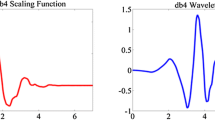Abstract
This work proposes an Eigen-based type-2 fuzzy algorithm for analysis of power signal disturbances. The power quality disturbances are random and non-linear by nature so the role of a particle filter is to estimate various parameters such as amplitude and phase. Particle filtering is now the most popular for tracking and signal processing. It has gained popularity in the signal processing by virtue of its ability to deal with non-linear and non-Gaussian systems.Our approach is to define an orthogonal matrix, for multiple power quality events then to evaluate Eigen values of estimated parameters. These Eigen values play an important role in detection of power quality events the estimated parameters and Eigen values applied as input to type-2 fuzzy for classification of power quality events. Finally robustness of algorithm in terms of improved accuracy and correctness with actual industrial data set of power quality events is compared under three different SNR conditions of 30, 20 and 10 dB with support vector machine, neural network based techniques and type-1 fuzzy logic based classification methods. High accuracy and less computation time make this algorithm robust and a suitable choice for non-linear and non-stationary power quality events analysis.











Similar content being viewed by others
References
Rahul: Review of signal processing techniques and machine learning algorithms for power quality analysis. Adv. Theory Simul. 3(10), 2000118 (2020)
Lee, I.W.C., Dash, P.K.: S-transform based intelligent system for classification of power quality disturbance signals. IEEE Trans. Ind. Electron. 50(4), 800–805 (2003)
Jurado, F., Saenz, J.R.: Comparison between discrete STFT and wavelets for the analysis of power quality events. Electr. Power Syst. Res. 62(3), 183–190 (2002)
Murat, U., Selcuk, Y., Tunay, G.M.: An effective wavelet based feature extraction method for classification of power quality disturbance signals. Electr. Power Syst. Res. 78, 1747–1755 (2008)
Rahul, R., Kapoor, R., Tripathi, M.M.: Hilbert Huang transform and type-1 fuzzy based recognition and classification of power signal disturbances. In: 2018 International Conference on Recent Innovations in Electrical, Electronics & Communication Engineering (ICRIEECE), Bhubaneswar, India, pp. 2198–2203 (2018)
Mahela, O.P., Shaik, A.G.: Recognition of power quality disturbances using S-transform based ruled decision tree and fuzzy C-means clustering classifiers. Appl. Soft Comput. 59, 243–257 (2017)
Rahul: Dual tree complex wavelet transform with multi-objective optimization algorithm for real time power quality events classification. Adv. Theory Simul. 3(10), 2000141 (2020)
Reddy, J.B.V., Dash, P.K., Samantaray, R., Moharana, A.K.: Fast tracking of power quality disturbance signals using an optimized unscented filter. IEEE Trans. Instrum. Meas. 58(12), 3943–3952 (2009)
Cisneros-Magaña, R., Medina, A., Dinavahi, V., Ramos-Paz, A.: Time-domain power quality state estimation based on Kalman filter using parallel computing on graphics processing units. IEEE Access 6, 21152–21163 (2018)
Xi, Y., Li, Z., Zeng, X., Tang, X., Liu, Q., Xiao, H.: Detection of power quality disturbances using an adaptive process noise covariance Kalman filter. Digit. Signal Process. 76, 34–49 (2018)
Singh, S.K., Sinha, N., Goswami, A.K., Sinha, N.: Several variants of Kalman filter algorithm for power system harmonic estimation. Int. J. Electr. Power Energy Syst. 78, 793–800 (2016)
Xi, Y.H., Li, Z.W., Zeng, X.J., et al.: Detection of voltage sag using an adaptive extended Kalman filter based on maximum likelihood. J. Electr. Eng. Technol. 12(3), 1016–1026 (2017)
Xi, Y.H., Peng, H., Chen, X.H.: A sequential learning algorithm based on adaptive particle filtering for RBF networks. Neural Comput. Appl. 25(3), 807–814 (2014)
Kim, Y., Hong, K., Bang, H.: Utilizing out-of-sequence measurement for ambiguous update in particle filtering. IEEE Trans. Aerosp. Electron. Syst. 54(1), 493–501 (2018)
Ding, J., Chen, J., Lin, J., Jiang, G.: Particle filtering-based recursive identification for controlled auto-regressive systems with quantized output. IET Control Theory Appl. 13(14), 2181–2187 (2019)
Rahul: A novel approach to power quality analysis: adaptive FEM algorithm with sparse signal decomposition. Adv. Theory Simul. 3(9), 2000095 (2020)
Zeng, Y., Lam, H.-K., Wu, L.: Model reduction of discrete-time interval type-2 T-S fuzzy systems. IEEE Trans. Fuzzy Syst. 26(6), 3545–3554 (2018)
VijayalakshmiPai, G.A.: Fuzzy decision theory based meta heuristic portfolio optimization and active rebalancing using interval type-2 fuzzy sets. IEEE Trans. Fuzzy Syst. 25(2), 377–391 (2017)
Moravej, Z., Pazoki, M., Niasati, M., Abdoos, A.A.: A hybrid intelligence approach for power quality disturbances detection and classification. Eur. Trans. Electr. Power 23(7), 914–929 (2013)
Mehera, S.K., Pradhan, A.K.: Fuzzy classifiers for power quality events analysis. Electr. Power Syst. Res. 80, 71–76 (2010)
Khokhar, S., Zin, A.A.M., Memonb, A.P., Mokhtar, A.S.: A new optimal feature selection algorithm for classification of power quality disturbances using discrete wavelet transform and probabilistic neural network. Measurement 95, 246–259 (2017)
Abdoos, A.A., Mianaei, P.K., Ghadikolaei, M.R.: Combined VMD-SVM based feature selection method for classification of power quality events. Appl. Soft Comput. 38, 637–646 (2016)
Hashemi, F., Mohammadi, M.: Islanding detection approach with negligible non-detection zone based on feature extraction discrete wavelet transform and artificial neural network. Int. Trans. Electr. Energy Syst. 26(10), 2172–2192 (2016)
Jamil, M., Singh, R., Sharma, S.K.: Fault identification in electrical power distribution system using combined discrete wavelet transform and fuzzy logic. J. Electr. Syst. Inf. Technol. 2, 257–267 (2015)
Kanirajan, P., Kumar, V.S.: Power quality disturbance detection and classification using wavelet and RBFNN. Appl. Soft Comput. 35, 470–481 (2015)
Moravej, Z., Abdoos, A.A., Pazoki, M.: Detection and classification of power quality disturbances using wavelet transform and support vector machines. Electr. Power Compon. Syst. 38, 182–196 (2009)
Author information
Authors and Affiliations
Corresponding author
Additional information
Publisher's Note
Springer Nature remains neutral with regard to jurisdictional claims in published maps and institutional affiliations.
Rights and permissions
About this article
Cite this article
Rahul Multiple power quality events recognition and classification based on adaptive Eigen-based type-2 fuzzy logic algorithm. Iran J Comput Sci 5, 55–68 (2022). https://doi.org/10.1007/s42044-021-00088-0
Received:
Accepted:
Published:
Issue Date:
DOI: https://doi.org/10.1007/s42044-021-00088-0




